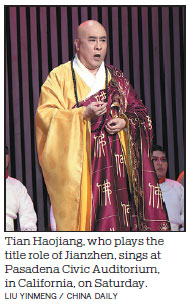
The story of an eminent monk who became the symbol of cultural exchange between China and Japan is being shown to American audiences through a lens familiar to Western art-lovers: opera.
The US debut of Voyage to the East: A Fearless Buddhist Master's Mission to Japan, an original Chinese contemporary opera produced by a group of Chinese artists, opened on Saturday in Pasadena, California.
The 2,997-seat Pasadena Civic Auditorium, a venue for many Broadway musicals, was jampacked.
The opera relates the story of the Buddhist monk Jianzhen, who lived from 688 to 763 during the Tang Dynasty (618-907). In Japan, Jianzhen is known as Ganjin.
Kathleen Sage, an opera enthusiast, said it was the first time she learned about the story behind Jianzhen's voyage, but it's easy to understand the tale.
"It's very similar (to Western opera). It has parts, different parts, it has beautiful melodies... the music is slightly more oriental, but the story is whole-hearted, and the story is very possible; the voices are beautiful," she said.
Elena De La Torre, who attended the performance with her husband, Jeffrey, said the play conveys the importance of cultural exchange.
"Through knowledge and education is where understanding comes from. We understand we are not so different, that we are very much alike," she told China Daily.
Chinese Consul General Zhang Ping, a special guest at the play's debut, said: "Just as each civilization is a little bit different from each other, there is a lot we can learn, a lot we can share amongst ourselves. It recreated Master Jianzhen's spirit in the present-day context."
The opera is hosted by the Jiangsu Cultural Exchange Association and organized by China-Jiangsu Performance Arts Group Co Ltd, Fo Guang Shan Hsi Lai Temple, and Fo Guang Shan New York Temple. It is co-organized by US Jiangsu General Chamber of Commerce.
"Although the story of the opera took place in the East, we hope to transfer the value of the story across the Pacific Ocean, to the West. In doing so, we hope to improve Sino-US relations, and play a greater role in cultural exchanges between the American and the Chinese people," said Zheng Zeyun, president of China-Jiangsu Performance Arts Group Co Ltd.
The performance tells an Oriental story through opera, a key part of Western classical music tradition, Zheng said.
The stage design will be filled with Chinese cultural elements from Jiangsu. For example, Wuting Bridge, a symbolic structure from Yangzhou, will be part of the stage design. Structural elements of ancient temples from Jiangsu will also be integrated into the stage set, Zheng said.
"We hope this play could serve as the bridge between Chinese and Western culture. We hope we could explore a new artistic style and a new method for cultural exchange between China and the West."
The troupe will stage a second show at the Pasadena performance hall on Sunday. It will then move on to New York's David H. Kotch Theater at Lincoln Center for two shows on June 22 and 23.
The opera brings to life the story of Buddhist monk Jianzhen, who is credited with helping to promote Buddhism in Japan and spread the culture of the Tang Dynasty.
Librettist Feng Baiming said he wants to depict the persistence of Jianzhen and his commitment to his belief.
In 742, an emissary from Japan visited China and invited Jianzhen, who was the abbot of Daming Temple in his hometown of Yangzhou, Suzhou Province, to lecture in Japan.
In 743, Jianzhen and his apprentices embarked on a voyage to Japan. However, they were stranded on a deserted island because of a shipwreck. Little did he know at the time it would take over a decade and another five attempts before he could reach Japan, due to bad weather and intervention from the local officials.
In 754, when 66-year-old Jianzhen finally landed in Japan, he had lost his eyesight due to a disease. He received a warm welcome from the Japanese emperor and the public. He even set up a famous temple named Toshodai-ji in the city of Nara.
"Jianzhen is one of the greatest cultural ambassadors from China to the world and Japan... because he not only brought Buddhism there, but also architecture and medicine," said Tian Haojiang, who plays the title role of Jianzhen.
teresaliu@chinadailyusa.com